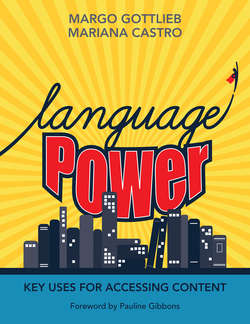Читать книгу Language Power - Margo Gottlieb - Страница 31
На сайте Литреса книга снята с продажи.
Explore
ОглавлениеWhen students go to school, they engage in many activities, from making friends, to negotiating meaning, to sharing what they know and how they know it. Language facilitates students’ participation in all of these activities. The term academic language has been historically used to describe the processing and production of language used to share concepts, ideas, and information of the disciplines in school contexts (Bailey, 2007; Feldman & Kinsella, 2008; Gottlieb & Ernst-Slavit, 2014; Schlepegrell, 2004). In this book, we propose extending this definition to encompass all school-related activities in which students participate. When students interact with peers or their teachers and are involved in complex thinking, they do not necessarily use discipline-specific language, even though they may be using language for academic purposes. Such language can also be used to problem-solve, to collaborate, or to promote social justice. In other words, language use in schools does not fit into a traditional dichotomy of social and academic language. Language use is multifaceted, as the interaction among the contexts, participants, and activities that take place in school is complex and varied (Gee, 2004; Holland, 2005). This complexity is what we try to encapsulate in the term academic language.
Academic language, defined from a broader perspective as a means for students to engage in school, includes social interaction, making meaning, and accessing academic content. Many students who enter our classrooms bring with them experiences and ways of knowing and learning about the world that may differ from those described in challenging academic standards. As educators, one of our roles is to create connections between the two so that all students have the tools needed to meaningfully participate in learning. Making these connections with each and every student is one of the ways we can work toward equity in our classrooms.
Take the DARE
Reflect on or discuss with colleagues the role of language use in your school.
1 What opportunities do students have to use academic language every day?
2 How is language modeled in your school?
3 What models for language use exist in your classroom?
4 How do students and teachers use language with each other?
5 Is there an expectation for academic language use in your school? How is it conveyed?
6 Are students who are knowledgeable of multiple languages able to maximize their academic language use by being invited to communicate in more than one language?
